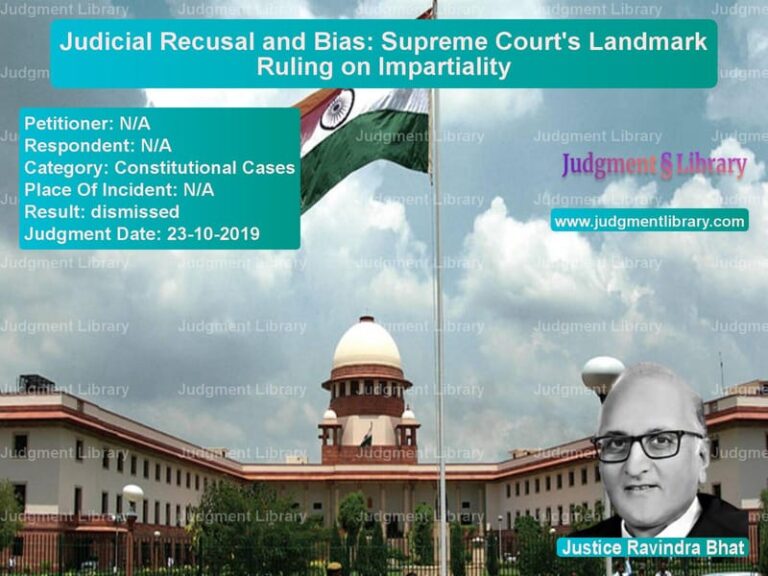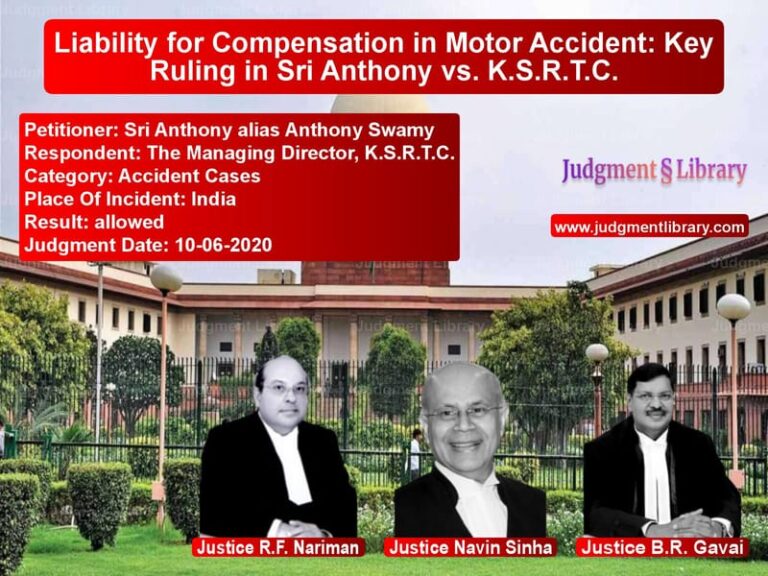Employment Contract and Overseas Deputation: Supreme Court Rules in Favor of Employee
The case of Sarita Singh v. M/s Shree Infosoft Private Limited revolves around a dispute regarding employment terms and financial recovery claims arising from an alleged overseas deputation. The Supreme Court examined whether the employer could enforce a recovery clause against an employee when there was no written deputation agreement.
Background of the Case
The appellant, Sarita Singh, was a software developer employed by the respondent, M/s Shree Infosoft Private Limited, a Gurgaon-based company engaged in software development. She joined the company on November 15, 2012, with an annual salary package of ₹13,50,400.
According to the terms of employment, she could be posted at any of the company’s locations, including domestic and overseas branches. The employment contract included a clause stating that if an employee was sent on overseas deputation, they were required to serve the company for a specific period upon return:
- Up to 30 days: Serve for 3 months after return.
- 31 to 90 days: Serve for 6 months after return.
- More than 90 days: Serve for 12 months after return.
On August 22, 2013, the appellant was sent to the United States for a meeting. Initially planned for one week, her stay was extended until September 20, 2013. The company covered her travel and accommodation expenses. Upon returning to India on September 21, 2013, she continued working and was promoted to Senior Project Manager with an increased annual package of ₹16 lakhs.
However, due to management changes, the appellant faced workplace issues. She resigned on December 12, 2013. Her resignation was accepted on December 14, 2013, and she was relieved of her duties by December 18, 2013.
Financial Dispute and Legal Proceedings
On May 22, 2014, the company sent a legal notice demanding ₹5,70,753 from the appellant, claiming expenses incurred on her overseas deputation and notice period salary. The appellant responded on June 3, 2014, denying liability.
The company then filed a suit in the Civil Judge (Senior Division), Gurgaon, seeking recovery. On August 9, 2016, the trial court ruled in favor of the company, ordering the appellant to pay ₹3,14,590 plus interest at 9% per annum. The ruling was upheld by the Additional District Judge, Gurugram, on November 29, 2017. The appellant’s second appeal was dismissed by the Punjab and Haryana High Court on August 1, 2018.
Arguments of the Appellant (Sarita Singh)
- The appellant argued that she was sent abroad for a business meeting, not on deputation, as there was no written agreement.
- The company failed to prove that her visit constituted an overseas deputation requiring a service bond.
- She resigned due to workplace issues, and her resignation was accepted without conditions.
- The demand for recovery was retaliatory and meant to harass her after resignation.
Arguments of the Respondent (Shree Infosoft Private Limited)
- The company contended that the appellant was bound by the employment contract, which required a service period after overseas deputation.
- As she left the company without serving the required tenure, she was liable to repay expenses incurred on her foreign trip.
- The company’s travel policy applied to all employees, and the appellant was aware of the rules.
Key Observations of the Supreme Court
1. Lack of Evidence for Overseas Deputation
The Court emphasized that the employer must provide clear proof that the appellant was sent on deputation. It observed:
“The burden of proving that the appellant was deputed overseas lies on the employer. There is no written agreement indicating that the appellant was on deputation.”
2. Meaning of ‘Deputation’ in Employment Law
The Court referenced previous judgments defining deputation as a formal agreement requiring the employee’s consent:
“Deputation occurs when an employee is temporarily assigned to another organization or branch with specific terms. In this case, there is no evidence that the appellant was deputed under any such agreement.”
3. Resignation Was Unconditional
The Court found that the appellant’s resignation was accepted without any conditions regarding service tenure:
“When an employer accepts an employee’s resignation without imposing financial conditions, subsequent claims for recovery are unsustainable.”
4. Harassment of the Employee
The Court criticized the company for attempting to penalize the appellant post-resignation:
“The appellant was subjected to unnecessary litigation. When employees raise workplace concerns and resign, employers cannot retaliate by initiating financial claims without basis.”
Final Judgment
The Supreme Court ruled in favor of the appellant and issued the following directives:
- The High Court’s judgment was set aside.
- The suit filed by the company for financial recovery was dismissed.
- The company was directed to pay ₹1 lakh in litigation costs to the appellant within one month.
The Court strongly reiterated that companies must have clear contractual agreements before enforcing financial recovery clauses against employees. This ruling ensures that employees are not unfairly burdened with repayment claims unless explicitly agreed upon in writing.
Petitioner Name: Sarita Singh.Respondent Name: M/s Shree Infosoft Private Limited.Judgment By: Justice Dhananjaya Y Chandrachud, Justice A S Bopanna.Place Of Incident: Gurgaon, India.Judgment Date: 12-01-2022.
Don’t miss out on the full details! Download the complete judgment in PDF format below and gain valuable insights instantly!
Download Judgment: sarita-singh-vs-ms-shree-infosoft-p-supreme-court-of-india-judgment-dated-12-01-2022.pdf
Directly Download Judgment: Directly download this Judgment
See all petitions in Employment Disputes
See all petitions in Public Sector Employees
See all petitions in Contractual Employment
See all petitions in Judgment by Dhananjaya Y Chandrachud
See all petitions in Judgment by A. S. Bopanna
See all petitions in allowed
See all petitions in Quashed
See all petitions in supreme court of India judgments January 2022
See all petitions in 2022 judgments
See all posts in Service Matters Category
See all allowed petitions in Service Matters Category
See all Dismissed petitions in Service Matters Category
See all partially allowed petitions in Service Matters Category







